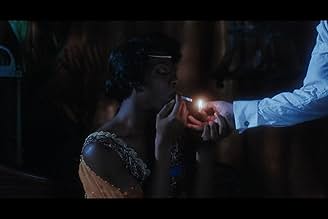PUNTUACIÓN EN IMDb
7,4/10
3 mil
TU PUNTUACIÓN
Añade un argumento en tu idiomaWhen a bishop comes to a prison to hear the confession of an old friend he is forced to watch a play, performed by the inmates, about their youth together, love and betrayal.When a bishop comes to a prison to hear the confession of an old friend he is forced to watch a play, performed by the inmates, about their youth together, love and betrayal.When a bishop comes to a prison to hear the confession of an old friend he is forced to watch a play, performed by the inmates, about their youth together, love and betrayal.
- Dirección
- Guión
- Reparto principal
- Premios
- 8 premios y 14 nominaciones en total
Benoît Lagrandeur
- Prison Ensemble
- (as Benoit Lagrandeur)
Pierre Leblanc
- Prison Ensemble
- (as Pierre LeBlanc)
Jean Lévesque
- Prison Ensemble
- (as Jean Levesque)
Reseñas destacadas
This film stands out in my collection as the most beautiful gay love story on film so far. It's lyrical story-telling is accented by it's Romeo & Juliet-inspired forbidden love theme, while avoiding any political message that plagues today's current stream of gay love stories. With it's gorgeous location, haunting sound-track and surreal moments of simple tenderness, Lilies succeeds at simply being a beautiful film.
This film is proof that some of the most iridescent, incredible films never make it to mainstream America. Barely anyone I know has even heard of this movie, and it's quite saddening. Although it has won numerous awards and lots of prestige in Canada, where it was made, I've often seen it lying on the shelf untouched at Blockbuster or gay film shops.
The movie begins with a prisoner named Simone who requests that a specific priest come to hear his confession. The priest, perplexed as to why he has been summoned, arrives at the prison, not knowing what to expect. It is soon divulged that the priest has some confessing of his own to be done when the prisoners trap him in his confessional box and begin to perform a play. This play is about Simone's childhood, when Simone was attending a Catholic all-boys boarding school and was in a gay relationship with his schoolmate, Valier. They keep their love clandestine until another schoolmate, Bilodeau (the priest as an adolescent), unearths something of what the two lovers have been doing. He confronts them about it, calling them a "disease," when it is revealed later that he is more insidious than they are.
Things take another dramatic turn when Simone's father discovers his son has kissed a boy and mutilates his body with a whip. Out of searing rage, Simone succombs to arson. A Parisian woman (who is portrayed by a male actor because the play is being performed by male prisoners) visits the schoool and falls in love with Simone. Despite the distinctely male features on her which expose the actor's gender, the he does an excellent job of emulating a pristine, romantic woman desperately seeking love.
Simone repudiates Valier, saying "it's time he started thinking about girls" and that he plans to marry the Parisian woman. Valier is devastated and runs to his mother, who is scorned by the rest of society because she believes herself to be a countess. She is shockingly compassionate and supportive when she learns of Valier's homosexuality. At the engagement banquet for Simone and his fiancee, Valier sabotages the celebration by dressing like a Greek God and reciting a monologue from the romantic Greek play he and his beloved were rehearsing together in the beginning of the film. And I can't tell you the rest. It'll ruin it. All I know is everyone should see this movie-especially gay Catholics. Incredible directing, eloquent dialogue, wonderfully abstract scenary-there's no way this movie could have been done better!
The movie begins with a prisoner named Simone who requests that a specific priest come to hear his confession. The priest, perplexed as to why he has been summoned, arrives at the prison, not knowing what to expect. It is soon divulged that the priest has some confessing of his own to be done when the prisoners trap him in his confessional box and begin to perform a play. This play is about Simone's childhood, when Simone was attending a Catholic all-boys boarding school and was in a gay relationship with his schoolmate, Valier. They keep their love clandestine until another schoolmate, Bilodeau (the priest as an adolescent), unearths something of what the two lovers have been doing. He confronts them about it, calling them a "disease," when it is revealed later that he is more insidious than they are.
Things take another dramatic turn when Simone's father discovers his son has kissed a boy and mutilates his body with a whip. Out of searing rage, Simone succombs to arson. A Parisian woman (who is portrayed by a male actor because the play is being performed by male prisoners) visits the schoool and falls in love with Simone. Despite the distinctely male features on her which expose the actor's gender, the he does an excellent job of emulating a pristine, romantic woman desperately seeking love.
Simone repudiates Valier, saying "it's time he started thinking about girls" and that he plans to marry the Parisian woman. Valier is devastated and runs to his mother, who is scorned by the rest of society because she believes herself to be a countess. She is shockingly compassionate and supportive when she learns of Valier's homosexuality. At the engagement banquet for Simone and his fiancee, Valier sabotages the celebration by dressing like a Greek God and reciting a monologue from the romantic Greek play he and his beloved were rehearsing together in the beginning of the film. And I can't tell you the rest. It'll ruin it. All I know is everyone should see this movie-especially gay Catholics. Incredible directing, eloquent dialogue, wonderfully abstract scenary-there's no way this movie could have been done better!
After a spate of disappointing gay films in the mid 90's, Lilies appeared from Canada as a fresh bouquet presenting a refreshing change of pace. Improving upon the play its based on, Lilies uses various cinematic conventions to its advantage, with cuts between prison re-enactments and the actual events given seamlessly and often artisticly breathtaking. The use of cross gender casting (this is an all male film) is humorous to a degree, but never in a mocking drag queen tone. We come to believe these men are really women. And the coming of age love story at the center of the plot, done to death by so many other films, is achingly tender.
It was once said that gay work has to have someone die in it and this film is no exception. But the deaths portrayed here and the long hidden betrayal finally revealed are handled quite effectively. The artifice involved only adds an extra layer of beauty upon the story. A remarkable acheivement.
It was once said that gay work has to have someone die in it and this film is no exception. But the deaths portrayed here and the long hidden betrayal finally revealed are handled quite effectively. The artifice involved only adds an extra layer of beauty upon the story. A remarkable acheivement.
This is a film of rare and astonishing brilliance, and unlike anything I personally have ever encountered before. It is exquisitely photographed and edited, and the acting is first rate all round. The all-male cast portraying both men and women might be off-putting for some, but it is performed so expertly that one forgets this detail - it is a film that magnificently transcends gender. In particular is Brent Carver's resplendent turn as the `mad countess,' the gentle, guileless mother of one of the young heroes. The story is a heartbreaking tale of love, jealousy, and ultimately, of Judgement Day, of the Day of Reckoning. That its storyline is about gay love should not put off heterosexual film goers, because the theme is timeless and universal. A bold and brilliant must see.'
10Tesse
Everyone does things they would rather forget. Lilies is about one man's horrible sin returning to haunt him, 40 years after the fact. As a rash child, young Jean Bilodeau did all he could to seperate gay lovers Simon and Vallier- not for any high-minded moralistic reason, but out of his own jealousy and desire for Simon. 40 years later, Bilodeau and Simon meet again, and witness their history performed by prisoners in a Quebecois jail. What results is heartwrenching and beautiful.
The cinematography of Lilies is flawless, moving effortlessly between 1952 and 1912 with lush, vivid colours. The performances are also excellent, with Brent Carver a notable standout as Vallier's deluded mother (as the movie is a play set in a jail, we see the male prisoners perform all of the roles, including the female ones). Jason Cadieux and Danny Gilmore are beautiful as the young lovers going through the awkward pangs of adolesense, coming out, and first love. A truly beautiful movie for anyone who loves a good cinematic experience, I cannot recommend Lilies enough.
The cinematography of Lilies is flawless, moving effortlessly between 1952 and 1912 with lush, vivid colours. The performances are also excellent, with Brent Carver a notable standout as Vallier's deluded mother (as the movie is a play set in a jail, we see the male prisoners perform all of the roles, including the female ones). Jason Cadieux and Danny Gilmore are beautiful as the young lovers going through the awkward pangs of adolesense, coming out, and first love. A truly beautiful movie for anyone who loves a good cinematic experience, I cannot recommend Lilies enough.
¿Sabías que...?
- Citas
Young Simon: [to Vallier] I shall be reborn. My breath in the heavens, bear witness. We shall be free. We'll we be loved. If you do truly love me, let your love be known unto me.
Selecciones populares
Inicia sesión para calificar y añadir a tu lista para recibir recomendaciones personalizadas
- How long is Lilies?Con tecnología de Alexa
Detalles
Taquilla
- Presupuesto
- 2.200.000 CAD (estimación)
- Recaudación en Estados Unidos y Canadá
- 301.548 US$
- Fin de semana de estreno en EE. UU. y Canadá
- 28.781 US$
- 12 oct 1997
- Recaudación en todo el mundo
- 301.548 US$
Contribuir a esta página
Sugerir un cambio o añadir el contenido que falta
































